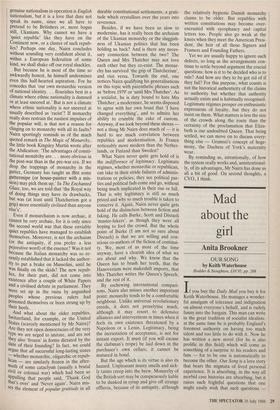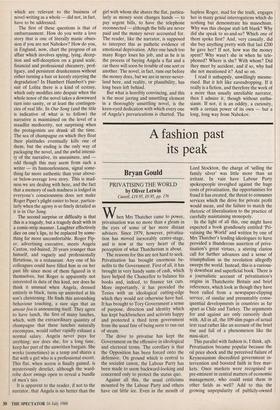Mad about the girl
Anita Brookner
OUR SONG by Keith Waterhouse
Hodder & Stoughton, £10.95, pp. 208
If you buy the Daily Mail you buy it for Keith Waterhouse. He manages a wonder- ful amalgam of tolerance and indignation on almost everyone's behalf, and is rudely funny into the bargain. This man can write in the great tradition of socialist idealists: at the same time he is probably England's foremost authority on having too much talent and too little to do with it. Now he has written a new novel (for he is also prolific in this field) which will come as something of a *surprise to his readers and fans — for to be one is automatically to become the other. Our Song is a love story that bears the stigmata of lived personal experience. It is absorbing, in the way all morbid case histories are absorbing, but it raises such frightful questions that one might easily wish that such questions — which are relevant to the business of novel-writing as a whole — did not, in fact, have to be addressed.
The first of these questions is that of embarrassment. How do you write a love story that is one of literally manic obses- sion if you are not Nabokov? How do you, in England, now, chart the progress of an affair which involves spying, lying, decep- tion and self-deception on a grand scale, financial and professional chicanery, prof- ligacy, and persistent drunkenness without either turning a hair or keenly enjoying the degradation? In Humbert Humbert's pur- suit of Lolita there is a kind of ecstasy, which only modifies into despair when the whole tenor of the novel takes a downward turn into sanity, or at least the contingen- cies of real life. In Our Song (and the title is indicative of what is to follow) the narrative is maintained on the level of a maudlin mediocrity, not surprising when the protagonists are drunk all the time. The sea of champagne on which they float their platitudes eventually kills one of them, but the ending is the only way of packaging the novel, and the awful intensi- ty of the narrative, its uneasiness, and odd though this may seem from such a writer — its humourlessness, signal some- thing far more authentic than your above- or below-average love story. This is mad- ness we are dealing with here, and the fact that a memory of such madness is lodged in everyone's consciousness does not make Roger Piper's plight easier to bear, particu- larly when the agony is so finely detailed as it is in Our Song.
The second surprise or difficulty is that this is a tragedy, but a tragedy dealt with in a comic-strip manner. Laughter effectively dies on one's lips, to be replaced by some- thing far more uncomfortable. Roger Pip- er, advertising executive, meets Angela Caxton, red-haired, 20 years younger than himself, and vaguely and professionally flirtatious, in a restaurant. Any one of his colleagues could have filled him in on her past life since most of them figured in it themselves, but Roger is apparently not interested in data of this kind, nor does he think it unusual when Angela, dressed entirely in black, turns up uninvited at his son's christening. He finds this astonishing behaviour touching, a sure sign that an amour fou is announcing itself. They agree to have lunch, the first of many lunches, which, with the extraordinary quantity of champagne that these lunches naturally encompass, would rather rapidly exhaust a normal salary. Angela never pays for anything; nor does she, for a long time, keep her part of the unwritten bargain. She works (sometimes) as a temp and shares a flat with a girl who is a professional escort. This flat, when access is finally gained, is mysteriously derelict, although the ward- robe door swings open to reveal a bundle of men's ties.
It is apparent to the reader, if not to the narrator, that Angela is no better than the girl with whom she shares the flat, particu- larly as money soon changes hands — to pay urgent bills, to have the telephone reconnected — although the bills are never paid and the money never accounted for. The reader, like the narrator, is supposed to interpret this as pathetic evidence of emotional deprivation. After one lunch too many Roger loses his job, and as he is in the process of buying Angela a flat and a car there will soon be trouble of one sort or another. The novel, in fact, runs out before the money does, but we are in never-never- land here, and reality, or plausibility, has long been left behind.
But what is horribly convincing, and this is the most jarring and unsettling element in a thoroughly unsettling novel, is the keen-eyed dedication with which every one of Angela's prevarications is charted. The hapless Roger, mad for the truth, engages her in many genial interrogations which do nothing but demonstrate his masochism. Why was this cheque stub left blank? Why did she speak to so-and-so? Which one of them spoke first? And, very casually, did she buy anything pretty with that last £200 he gave her? If not, how was the money spent? Why wasn't she in when he tele- phoned? Where is she? With whom? Did they meet by accident, and if so, why had she not mentioned it? And so on.
I read it unhappily, unwillingly mesme- rised. But it felt like eavesdropping. If it really is a fiction, and therefore the work of a more than usually unreliable narrator, then I admire it, though without enthu- siasm. If not, it is an oddity, a curiosity, with a certain power of its own — but a long, long way from Nabokov.



















































 Previous page
Previous page